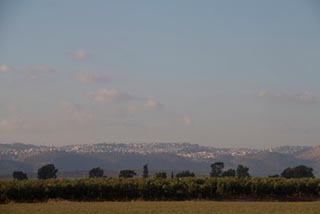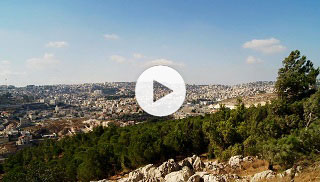2:1–12 Matthew continues his narrative of Jesus’ birth |
 The Virgin Shall Conceive: The Vocabulary of Virginity
The Virgin Shall Conceive: The Vocabulary of Virginity
2:1 Bethlehem of Judea Located about six miles south of Jerusalem.
about six miles south of Jerusalem.
Herod Refers to Herod the Great, who was from the region of Idumea, making him an illegitimate king in the opinions of many Jewish people. Following the death of his father, Antipater, Herod was made king of Judaea by Rome and ruled from 37–4 bc.
Herod the Great ruled Palestine on behalf of Rome. The first 24 years |
wise men The exact number of wise men (or Magi), their names, and their place of origin are uncertain. Throughout the ancient Near East, the births of extraordinary, savior-type figures were believed to coincide with astral phenomena. When a star (or planet) appeared over Jerusalem, the Magi believed that it heralded the King of the Jews. Compare note on Matt 2:2.
believed that it heralded the King of the Jews. Compare note on Matt 2:2.
The Magi (wise men) probably came from the Parthia Empire (a kingdom spanning modern Iraq and Iran). They were likely astrologers and royal courtiers. In Matthew’s narrative, they are depicted as foreign dignitaries. |
2:2 king of the Jews The Jews were already being ruled by a king—Herod. The political climate and traditional association of the Messiah with the house of David made it natural for Jews to assume that the Messiah would be a king.
star In the ancient Near East, people considered the movements of particular planets, stars, comets, meteors, and other astrological phenomena to be signs or portents. The reference to a star connects Jesus’ birth with the prophetic oracle in Num 24:17.
with the prophetic oracle in Num 24:17.
to worship him Implies the level of respect that citizens would pay to a king in antiquity.
2:3 he was troubled To Herod, the magi’s question indicates a potential rival to his throne.
all Jerusalem with him The city’s residents knew of Herod’s violence and were frightened at the prospect of further trouble. His slaughter of children (Matt 2:16) shows that their fear is justified.
2:4 calling together all the chief priests Herod is not demonstrating piety or respect for the priests in this instance; they functioned as his own cabinet and body of advisers. He requires their expertise to determine the Messiah’s birthplace.
scribes of the people Refers to trained interpreters of the law of Moses. They likely debated among themselves before giving Herod their answer; many competing messianic expectations existed at this time. (see note on 1:1).
where the Christ was to be born Herod’s actions do not demonstrate a hopeful anticipation concerning the coming of the Messiah; rather, he knows that anyone claiming to be the Messiah will be a threat to his rule. Most likely, he fears that someone will use the child as a figurehead in a military uprising.
2:6 no means least Matthew’s reading of Mic 5:2 reflects neither the original Hebrew nor the Septuagint (Greek) translation. However, it is likely that multiple Greek translations were available at this time. Additionally, Matthew may have made his own translation, quoting from memory or paraphrasing. Despite the variations in the text, the sense is the same: Bethlehem’s importance comes from its connection to David and the Davidic Messiah.
 Jesus’ Fulfillment of Old Testament Prophecy Table
Jesus’ Fulfillment of Old Testament Prophecy Table
The ot in Matthew 2 | |
will shepherd Ancient Near Eastern rulers often are portrayed as shepherds. The same imagery is used throughout the ot (see Ezek 34:23 and note; Jer 23:1–4; note on John 10:1–42).
The same imagery is used throughout the ot (see Ezek 34:23 and note; Jer 23:1–4; note on John 10:1–42).
2:7 secretly summoned the wise men All of Jerusalem had already heard of the magi’s arrival. Herod keeps their specific mission to Bethlehem secret and probably also orders the priests and scribes to do the same.
the time when the star appeared Indicates that time had already passed since Jesus’ birth. Compare note on Matt 2:16.
Compare note on Matt 2:16.
2:8 when you have found him, report to me The magi likely came to Herod expecting to find the child in his palace.
likely came to Herod expecting to find the child in his palace.
2:9 led them This unusual activity demonstrates that the star is a supernatural phenomenon.
is a supernatural phenomenon.
2:10 when they saw the star, they rejoiced Their reaction implies that the star had disappeared previously and had only now reappeared (perhaps due to the inability to view stars during the daytime). They also were joyful because the star’s stopping place indicated the Messiah’s location.
2:11 they fell down and worshiped him This was a common custom in the ancient Near East for honoring kings, who were viewed as divine figures.
gold and frankincense and myrrh These were costly luxury items suitable as gifts for the birth of an important or royal figure.
2:12 being warned Matthew does not identify the warning’s origin. Throughout his narrative, he commonly ascribes dreams to God and His emissaries.
2:13–15 Joseph is warned in a dream to flee with his family to Egypt. They hide there until Herod dies, and then return home. |
2:13 angel of the Lord As in Matt 1:20, Matthew clearly identifies the messenger here.
flee to Egypt Recalls the Israelites’ time in Egypt. This situation also reflects Jeroboam’s flight into Egypt when Solomon wished to kill him (1 Kgs 11:40). God promised Jeroboam kingship; when Solomon died, Jeroboam returned from Egypt and became king.
2:15 would be fulfilled The ordinary expectations of the Messiah would not have included fleeing into Egypt, but Matthew presents even this as fulfilling prophecy. He sees an analogy between Israel—the children of God (Exod 4:23)—and Jesus, the Son of God. Jesus emerged from Egypt just as Israel had during the exodus (Exod 9–14). In addition, the rulers in both narratives order the slaughter of infants (Exod 1:22; Matt 2:16).
 Jesus’ Fulfillment of Old Testament Prophecy Table
Jesus’ Fulfillment of Old Testament Prophecy Table
Out of Egypt I called my son Quoted from Hos 11:1, where it refers to the historic events of the exodus. Matthew uses typology in applying this this text—which originally referred to God’s corporate people, Israel—to Jesus, God’s Messiah.
in applying this this text—which originally referred to God’s corporate people, Israel—to Jesus, God’s Messiah.
2:16–18 In a desperate move, Herod slaughters all the male children in and around Bethlehem in hopes of exterminating the promised child. |
2:16 he had been deceived The Greek word used here, empaizō, usually means “to mock” or “to ridicule,” indicating that the magi’s noncompliance was disgraceful to Herod.
two years old and under This detail implies that the wise men (Magi) first saw the star long before they came to Jerusalem. It also suggests that Jesus was probably more than a year old at this time. Bethlehem was very small; perhaps about 20 children were killed.
2:17 was fulfilled Another fulfillment (compare Matt 1:22–23; 2:5–6, 15, 17–18). In the following quote, Jeremiah is discussing the exile. Matthew takes this also as a reference to the Christ.
2:18 A voice was heard in Ramah Matthew quotes Jer 31:15; the context of children being slaughtered and Jesus’ family being uprooted parallels the context of Jeremiah’s prophecy.
 Jesus’ Fulfillment of Old Testament Prophecy Table
Jesus’ Fulfillment of Old Testament Prophecy Table
2:19–23 Upon Herod the Great’s death (ca. 4 bc), Joseph, Mary, and Jesus return from Egypt. |
2:19 Herod had died After Herod’s death, his kingdom was divided among his sons, Archelaus, Antipas, and Philip. See note on Luke 3:1.
2:22 he was afraid to go there Joseph’s fear is justified; Archelaus was as cruel as his father.
 Political Leaders in the New Testament Table
Political Leaders in the New Testament Table
being warned in a dream The Greek text here does not identify a specific messenger. There is no warning given against Antipas, Herod the Great’s son, who ruled in Galilee; this region is portrayed as a safe place for Jesus throughout Matthew’s Gospel.
this region is portrayed as a safe place for Jesus throughout Matthew’s Gospel.
2:23 He will be called a Nazarene The source of this quotation is unknown and it seems that Jewish people at the time did not expect the Messiah to come from Nazareth (see Matt 2:4–5; John 1:46). Matthew might have had the Hebrew word netser (“branch”) in mind from Isa 11:1, where it is used to describe a messianic figure descended from Jesse, the father of David.
(see Matt 2:4–5; John 1:46). Matthew might have had the Hebrew word netser (“branch”) in mind from Isa 11:1, where it is used to describe a messianic figure descended from Jesse, the father of David.

|
About Faithlife Study BibleFaithlife Study Bible (FSB) is your guide to the ancient world of the Old and New Testaments, with study notes and articles that draw from a wide range of academic research. FSB helps you learn how to think about interpretation methods and issues so that you can gain a deeper understanding of the text. |
| Copyright |
Copyright 2012 Logos Bible Software. |
| Support Info | fsb |
 Loading…
Loading…

 Herod the Great
Herod the Great  Magi
Magi 

